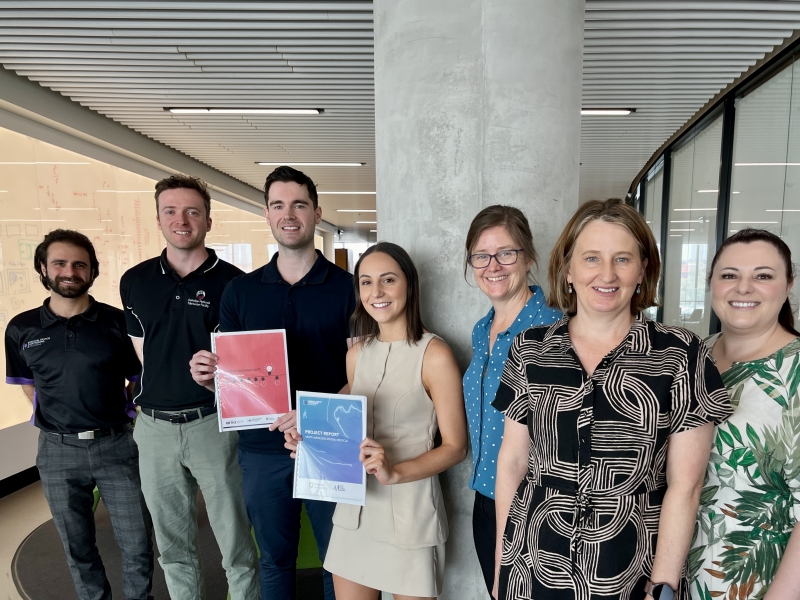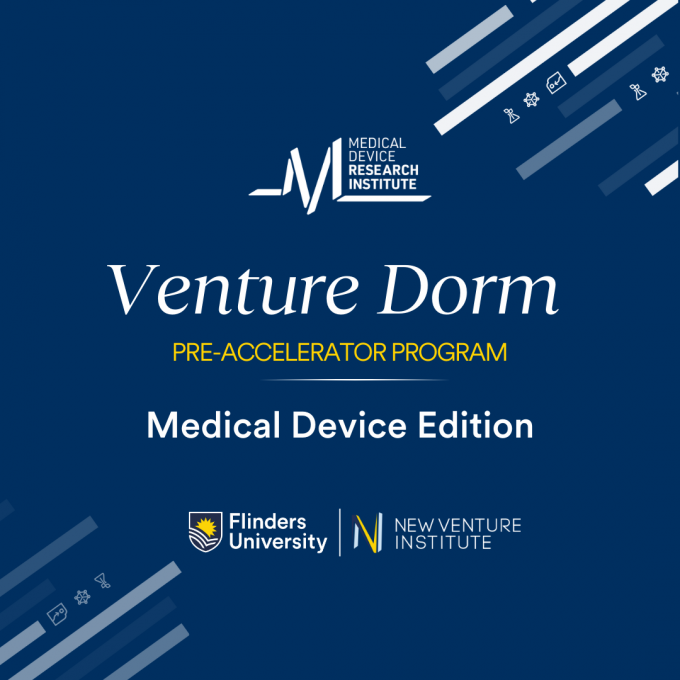News
Keep updated with the latest MDPP news via our newsletter.
Precision detection taking the guesswork out of pulse monitoring
An Australian medtech startup is harnessing frontline paramedic experience to develop Pulse Tile, a promising device set to accelerate cardiac arrest responses.
Founder and CEO, Elleesha King, a seasoned paramedic who's attended countless cardiac arrests, repeatedly saw the same issue: manual pulse checks are slow, stressful and subjective, causing critical delays in starting CPR or defibrillation. Pulse Tile has the potential to fill that gap – a compact device that quickly confirms the presence or absence of a pulse, empowering responders to act decisively.
Elleesha partnered with the Medical Device Partnering Program (MDPP) to turn her concept into a viable medical device. The collaboration connected her with skilled engineers and researchers who developed key features like detection algorithms, battery systems and neck-mounting solutions, delivering a working prototype and a polished technical report - perfect for investors and technical experts.
Describing the MDPP experience as both transformative and deeply validating, Elleesha said goin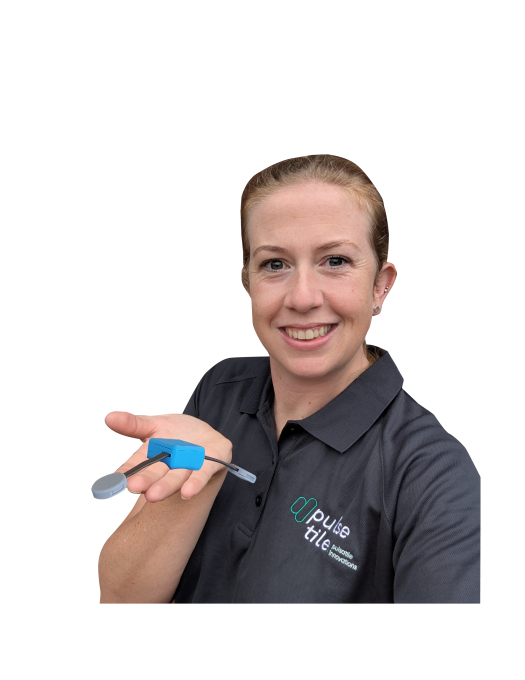 g through the program was a real turning point.
g through the program was a real turning point.
"Presenting to an expert panel and seeing their engagement was incredibly affirming," she said. "It confirmed this is a genuine clinical crisis – and Pulse Tile is a strong solution. MDPP didn't just advance our R&D; they gave us confidence, credibility and a solid milestone to build on."
"The collaboration with Karen and her fabulous team was invaluable," Elleesha added. "They've got the engineering brains and delivered R&D to a great standard. It was super validating to know there were people who genuinely wanted to help bring this project to life."
Featuring MDPP on pitch decks and at accelerators has boosted the startup's credibility, instantly signalling to investors and partners that Pulse Tile has already passed rigorous expert scrutiny.
Professor Karen Reynolds, MDPP Director, praised the project. "Supporting innovators like Elleesha, who bring sharp clinical insight and a clear vision for better care, is what MDPP is all about," she said. "We're proud to contribute our expertise to a critical care device that could save lives when every second counts."
With MDPP leading early R&D, Elleesha's team could parallel-track fundraising, strategy, and trial preparation— propelling them into clinical trials and successfully securing half their funding target.
Elleesha credits MDPP with sharpening their strategy and connecting her with experts dedicated to bringing life-saving devices to patients.
Do you have a bold idea for a novel medical device? MDPP is ready to help you bring it to life—get in touch today.
Jack Menzies, founder of Freeline Pty Ltd and an experienced occupational therapist, has developed a lifechanging innovation—the Mobile Step-Climbing Shower Commode—which has the potential to assist older Australians safely overcome bathroom steps and thresholds.
The solution was created through a close collaboration with Aged Care Research and Industry Innovation Australia (ARIIA) and Flinders University’s Medical Device Partnering Program (MDPP) as part of the now concluded ARIIA x MDPP Ideas Incubator.
The program supported early-stage aged care technology innovations by integrating tailored engineering and prototyping expertise from the MDPP team with ARIIA’s commercial market research and sector knowledge, enabling promising ideas to advance from initial concept through prototype development to thorough market validation.
 This multidisciplinary initiative harnessed clinical insights, sector expertise, engineering capabilities, and commercial acumen to address unmet needs in aged care, accelerating the development of practical, scalable solutions that can significantly improve care outcomes.
This multidisciplinary initiative harnessed clinical insights, sector expertise, engineering capabilities, and commercial acumen to address unmet needs in aged care, accelerating the development of practical, scalable solutions that can significantly improve care outcomes.
Through the Incubator, Jack’s Mobile Step-Climbing Shower Commode was refined and a prototype developed featuring an advanced wheel and propulsion system capable of climbing common bathroom obstacles like steps and shower thresholds.
Backed by MDPP’s engineering capabilities and ARIIA’s comprehensive market validation across aged care, palliative care, and hospital discharge sectors, the product’s technical feasibility, strong demand, and market readiness have been confirmed.
Key stakeholders have emphasised the commode’s potential to deliver timely, safe shower assistance without necessitating costly bathroom renovations. This innovation supports smoother transitions from hospital to home care and enables dignified end-of-life care, addressing the growing demand for community-based care solutions.
Professor Karen Reynolds, Director of MDPP, said, “The incubator applies practical engineering to real-world aged care challenges. Working with Jack at Freeline, we helped develop a device that makes personal care safer and more accessible within people’s own homes.”
Joanne Lee Tan, Industry Manager at ARIIA, added, “This project highlights how focused innovation empowers older Australians and their care providers alike. The Incubator fosters collaboration between aged care providers, researchers, and innovators to co-design solutions that truly meet sector needs.”
Reflecting on the Incubator experience, Jack said, “The support and expertise I have received provided invaluable design input and market insights, positioning us well for the next stages of product development, testing, and funding.”
Freeline’s Mobile Step-Climbing Shower Commode has the potential to provide a practical, affordable solution that enhances users’ safety and independence, while also easing the daily care challenges faced by families and healthcare providers.
A cutting-edge collaboration between North Eastern Community Hospital and the ARIIA x MDPP Ideas Incubator has resulted in several novel prototyped food cutters, enabling kitchen staff to deliver precise IDDSI Soft and Bite-Sized portions (1.5 x 1.5 cm) for residents facing swallowing and chewing challenges.
Through 250 hours of technical expertise from the Medical Device Partnering Program (MDPP) and 30 hours of commercial research via Aged Care Research and Industry Innovation Australia (ARIIA), the project produced three prototypes for North Eastern Community staff to begin trials that can potentially deliver safer, faster, and more consistent food preparation. The prototype cutting tools have potential applications across residential aged care, hospital, disability home care, palliative care, meal delivery services and childcare.
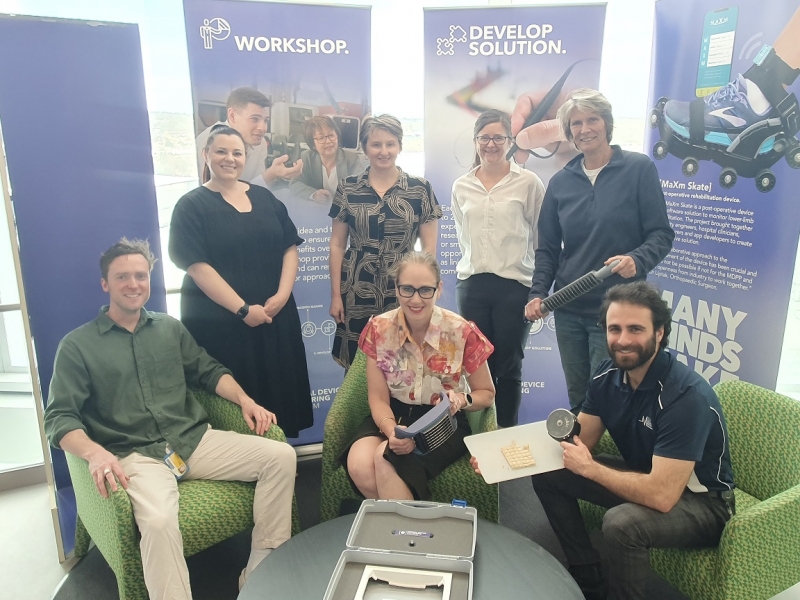 Cara Miller, CEO of North Eastern Community Hospital, praised the program’s role in assisting the service diversification goals of their organisation. “We’re being innovative and really thinking about where diversification of our services comes from, but always making sure compliance, our patients, and residents remain at the forefront of decision-making.”
Cara Miller, CEO of North Eastern Community Hospital, praised the program’s role in assisting the service diversification goals of their organisation. “We’re being innovative and really thinking about where diversification of our services comes from, but always making sure compliance, our patients, and residents remain at the forefront of decision-making.”
“The Ideas Incubator provided essential support to advance our concept from an initial idea to functional prototypes. Access to design expertise and structured feedback cycles accelerated development and ensured the innovation was grounded in real-world user needs,” said Cara.
She emphasised that food must remain “appealing, safe, and recognisable,” and was pleased involvement in the Ideas Incubator program fostered kitchen team engagement, through the co-design process, helping to build confidence and ownership from the staff in the new tools.
Cara added, “Investing in your workforce to find easier ways to do their jobs means they’ll thank you for it—you’ve got to keep moving forward or you’re out of the game.”
While the ARIIA x MDPP Ideas Incubator program has now concluded, projects like this demonstrate its enduring legacy in transforming aged care innovation.
Professor Karen Reynolds, Director of the Medical Device Partnering Program, explained, “The MDPP’s technical expertise enabled rapid prototyping tailored to aged care needs, bridging the gap between novel ideas and practical solutions.”
Joanna-Lee Tan from ARIIA added, “ARIIA’s commercial research identified strong market potential across aged care- both in-home and residential, hospital disability services, and potentially childcare sectors—this is a simple, practical tool addressing a common challenge in food preparation around the world with benefits to people living with swallowing difficulties as well as improving the quality and safety of food preparation and delivery Looking ahead, North Eastern Community Hospital plans to refine the prototypes for enhanced durability, ease of cleaning, and versatility across food types, alongside internal demonstrations and manufacturing partnerships.
Cara reflected, “Participation in the ARIIA x MDPP Ideas Incubator enhanced our capability in innovation processes—it’s refreshing to work with skilled teams to find solutions we otherwise wouldn’t have achieved. We’re considering further investment for a manufacture-ready prototype; there’s significant work ahead, but this program has given us a clear pathway.”
The ARIIA x MDPP Ideas Incubator exemplifies transformative collaboration to solve problems in aged care, proving these programs extend far beyond immediate solutions to build lasting capability for the aged care workforce and confidence in service provision for aged care providers.
A revolutionary digital platform is set to transform aged care by enabling organisations to deliver truly client-centred care - improving resident wellbeing and providing peace of mind for families across Australia.
Founded by New Word Order, Reminu was developed through a strong partnership with Aged Care Research & Industry Innovation Australia (ARIIA) and Flinders University’s Medical Device Partnering Program (MDPP) via the ARIIA x MDPP Ideas Incubator.
The platform provides user-friendly software accessible on handheld devices and desktops to document life stories, preferences, and future care plans. It gathers information directly from individuals and trusted sources, ensuring wishes are shared with care providers while preserving a dignified legacy of their life.
Australia’s ageing population is rising fast - by 2042, the number of people aged 85 and over will more than double to over one million, and those aged 65 and older will nearly double to more than 6.4 million. By 2050, almost one in four Australians will be aged 65 or older, significantly increasing demand for aged care.
Dementia adds to this challenge, with about 433,000 Australians living with dementi a in 2025 - a figure expected to nearly double by 2054. These trends highlight the urgent need for innovative, person-centred care solutions like Reminu to support individuals, families, and the increasing aged care workforce.
a in 2025 - a figure expected to nearly double by 2054. These trends highlight the urgent need for innovative, person-centred care solutions like Reminu to support individuals, families, and the increasing aged care workforce.
ARIIA’s expertise in evidence-based research, sector collaboration, and workforce development guided Reminu’s design to address these real needs.
Joanne-Lee Tan, Industry Manager at ARIIA, emphasised, “It is vital that residents are heard - their voice adds essential depth, making care truly person-centred, respectful, and more meaningful.”MDPP contributed specialised technical expertise, improving security, user experience, and integration with aged care systems.
Professor Karen Reynolds, Director of MDPP, said, “Our unique expertise fuses technology, research, and lived experience to improve health outcomes and set a new benchmark in aged care innovation.”
Working closely with New Word Order, ARIIA and MDPP helped refine Reminu prototype’s security, usability, and core functions as it was prepared for user testing.
Scott Oxford, Partner at New Word Order, reflected, “The workshops and sector validation facilitated by ARIIA challenged us with incredible questions that deepened our understanding of the project’s value and market potential.”
Reminu’s SaaS platform securely shares and stores personal information within a closed, trusted network, integrating smoothly with aged care systems.
Supporting Aged Care Quality Standards, Reminu recognises older people as valued individuals with rich histories. The platform aligns care with personal preferences, facilitates cultural sensitivity, helps reduce loneliness and anxiety and ensures each resident’s dignity is respected throughout their care journey.
The platform also offers significant peace of mind to family members, knowing their loved ones’ wishes and stories are being honoured. With Australia’s ageing population and dementia cases on the rise, aged care demand and workforce pressures will continue to intensify.
Adopting technology like Reminu is critical as these innovations enhance information sharing, streamline care coordination, reduce administrative burdens, and support greater independence, health and safety for ageing Australians.
New Word Order is exploring not-for-profit and impact investment options to broaden access through philanthropic funding.
For people with reduced mobility who spend extended periods seated, pressure injuries aren’t just uncomfortable - they can be painful, life‑altering, and even life‑threatening.
Adelaide innovator Mossa Medical is tackling this challenge through the ARIIA x MDPP Ideas Incubator, coordinated by Aged Care Research & Industry Innovation Australia (ARIIA), with technical support from Flinders University’s Medical Device Partnering Program (MDPP).
Together, they’ve developed an Automatic Smart Pressure Cushion prototype that monitors and adjusts pressure in selectively inflatable cells to protect users’ skin, comfort, and independence.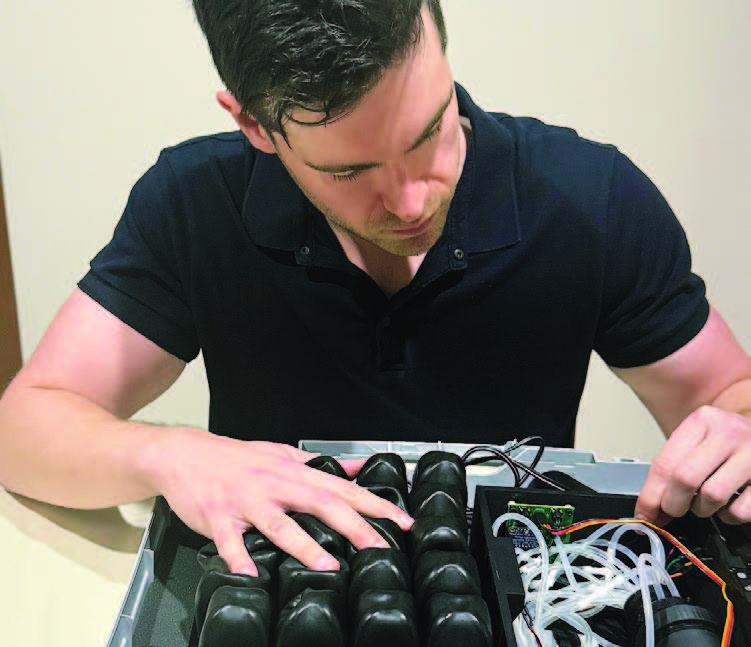
Pressure injuries are a serious and largely preventable issue, impacting 5.5% of people in residential aged care (over 10,500 cases annually) and costing up to AU$98,489 per case to treat. In hospitals, prevalence is 12.9%, with costs estimated at $9.11 billion each year - highlighting an urgent need for effective solutions.
Mossa Medical combines cutting edge technology with a patient-centred approach to create effective, sustainable solutions that prioritise healing, prevention, and overall well-being.
Their smart cushion uses sensors and adaptive air cells to deliver tailored, dynamic pressure relief in real time, reducing damaging pressure points and enabling longer, more comfortable sitting without compromising skin health.
Founder Andrew Mencel said the expert guidance and tailored support they received through the ARIIA x MDPP Ideas Incubator was invaluable.
“ARIIA’s deep understanding of the aged care market and strategic landscape combined with MDPP’s technical expertise in product prototyping have been crucial in positioning us strongly for the next stages of growth.”
ARIIA coordinated the program and provided a detailed market report with industry insights, while MDPP led product prototyping to create a functional proof-of-concept, delivering Mossa Medical both technical validation and market confidence.
Joanne-Lee Tan said ARIIA brings robust sector knowledge, market insight, and strategic guidance that ensure innovations align with real world needs in aged care.
“We offer a comprehensive support system - helping to bridge market opportunities and technical development.”
MDPP Director, Professor Karen Reynolds, said the combination of her team’s technical skills and engineering capabilities with ARIIA’s market insights and real user needs has helped move this product closer to making a real difference for people with mobility issues.
“Collaborative partnerships like this accelerate innovation and help ensure new technologies achieve genuine impact for users and the sector as a whole,” said Professor Reynolds.
With a proven prototype and a clear pathway forward, Mossa Medical is now seeking investment to build a full-scale clinical testing model and advance manufacturing plans.
This innovation holds tremendous promise for the health and aged care sectors - offering a powerful way to reduce largely preventable pressure injuries, enhance comfort, protect mobility, and dramatically improve the quality of life for some of the most vulnerable members of our community.
By transforming how pressure care is managed, this smart cushion could redefine aged care standards and bring greater independence and dignity to those who need it most.
Please be alert to a scam email currently circulating that falsely claims to be from the Medical Device Partnering Program (MDPP). These emails may request personal information or attempt to get you to click on suspicious links.
Please note that any legitimate communication from MDPP will not ask you to reply to another address or request any personal information. In particular any emails from Dr Zain Hammad claiming to be Chairman of MDPP are false!
If you receive any unexpected or unusual emails claiming to be from MDPP — especially those asking for personal details, financial information, or payments — do not respond, click any links, or open attachments.
If you’re unsure about the legitimacy of any message, please feel free to forward it to us at This email address is being protected from spambots. You need JavaScript enabled to view it. so we can verify it for you.
Thank you for your vigilance in helping us protect your information.
Turn your MedTech idea into reality with Venture Dorm: Medical Device Edition!
Venture Dorm is Flinders New Venture Institute’s award-winning pre-accelerator program, designed to fast-track innovation. The 2025 Medical Device Edition helps MedTech founders validate their ideas, understand industry challenges, and build sustainable business models.
Across 8 weeks, you’ll:
- Define and refine your idea with industry insights
- Validate market opportunities and industry fit
- Gain mentorship from MedTech experts
- Connect with like-minded founders and key industry players
Program Details:
📍 Flinders University at Tonsley
⏰ Tuesdays, 5:30 PM – 8:30 PM
🎓 Scholarships available for Flinders University alumni and students
Join a thriving MedTech startup community and take your venture to the next level.
Apply Now: https://www.nviflinders.com.au/venture-dorm-pre-accelerator/
